3 Reasons Why I Don’t Use a Woodworking Bench
Learn why I don’t use a woodworking bench. They’re big, heavy, and difficult to move. Instead, I’ll share the three benches I use in my small workshop.
Why I Don’t Use a Woodworking Bench
I love the look and feel of a traditional woodworking bench. They’re sturdy and usually made of an attractive hardwood. The problem is this type of bench is just too big, too heavy and too difficult to move in my small workshop. Instead, I’ll share the three space-saving worktables I use in my tiny shop.
This post contains affiliate links to supplies or tools I used to complete this project. Purchases made using these links help support the Saws on Skates website and allow me to share more DIY projects. and DIY tips with you. There is no cost to you for using these links. Click here to visit my site policies.
Before we get into why I don’t use a woodworking bench, be sure to click the subscribe button at the bottom of this page to sign up for my FREE weekly newsletter loaded with helpful pocket hole tricks, space-saving workshop ideas, clever DIY tips and more!
Table of Contents
What is a Woodworking Bench?
Wikipedia defines a woodworking bench as “a table used by woodworkers to hold workpieces while they are worked by other tools.” Wikipedia goes on to say a woodworking bench is “heavy and rigid enough to keep still while the wood is being worked.”
3 Reasons Why I Don’t Use a Woodworking Bench in My Small Workshop
Too Big
My workshop is small. It measures about 12×13. Those of us with small workshops don’t have room for a big woodworking bench. The legs and top of these benches are usually made of thick pieces of wood.
Related: My 12×13 Small Woodshop Layout
Those thick pieces of wood can trick our eyes. They can make a piece of furniture appear larger than it is. This can make a small workshop feel smaller than it actually is.
Woodworkers with small workshops need shop furniture that is properly scaled to the workspace. This will help a small workshop feel bigger.
Related: 9 Clever Ways to Make Your Small Workshop Feel Bigger
Too Heavy
A traditional woodworking bench is usually made with hardwoods like maple. I love the look of maple. It’s an attractive, durable wood, but it’s heavy. That means these type of benches usually weigh a lot.
A heavy bench would need to permanently live in my workshop. I would never be able to move it outside which means I would need another work table for outdoor DIY projects.
Difficult to Move
As I mentioned traditional woodworking benches are usually heavy which makes them difficult to move. Plus, woodworking benches typically don’t have wheels.
All of the tools in my small workshop are on wheels to maximize floor space.
Related: 7 Ideas to Make Your Tools Mobile & Maximize Workshop Space
What I Use Instead of a Woodworking Bench
I love the look of a traditional woodworking bench but they’re too big, too heavy and too difficult to move in my small workshop. DIYers with small workshops need a bench that’s small, lightweight, and mobile. And a multitasking work table would be even better. Bonus points if it could also fold flat so it could be stored out of the way.
I’m excited to share with you the three space-saving, multi-tasking benches that I use in my small workshop!
Folding Workbench
A folding workbench is perfect for those DIYers with a small workshop, shed, garage, or even those DIYers without a dedicated workshop. The space-saving design is easy to set up when we’re ready to work and fold up when we’re done. Plus, it’s portable, so we can move it from the shop to the yard, to a buddy’s house to help with a project.
We can use it can set a miter saw or a benchtop router table. We can use it to build and assemble our projects.
I often use mine as a finishing station either to apply a coat of stain or to spray my projects with a coat of paint.
I even use it to give my dog a haircut every month! Or we can throw a tablecloth on it, and we have a sturdy serving table for parties. This folding workbench is a real multitasker.
Related: How to Build a DIY Folding Workbench
Flip Top Tool Stand
A flip top tool stand has a rotating top. This means a tool like a miter saw, a small table saw or planer can be mounted on one side, then the top can be flipped. The other side can be used as a workbench. This means the stand can be stored out of the way to maximize floor space.
Many of the DIY furniture plans that I’ve shared here have been built on the bench side of this flip top tool stand.
Related: How to Build a DIY Flip Top Tool Stand
Mobile Project Center
DIYers with small workshops need a workbench that can be an assembly table, a clamping station, and a sawhorse. Wouldn’t it be great if our workbench could fold flat for storage? Or can you imagine if we could disassemble our workbench to free up floor space to build a big project?
That’s exactly what we can do with a Kreg Mobile Project Center!
Related: Why a Mobile Project Center Will Replace Your Traditional Workbench
I made my Mobile Project Center even more mobile by adding wheels. I built a simple DIY wood base and added six casters. This means I can roll it where I need it. Or I can completely remove it from my workshop when I’m working on a big project.
Related: How to Add Wheels to the Mobile Project Center
More Space-Saving Ideas
Looking for more space-saving ideas for your shop? Skate over to 5 Workbench Ideas for a Small Workshop.
Protect Your Investment
We can protect our investment with a workbench mat. A utility mat is an easy way to prevent messy glue spills from damaging our bench. A bench mat also protects our projects from being dented or scratched during assembly.
Related: Why Every Workshop Needs a Workbench Mat
Final Thoughts
I love the look and feel of a traditional woodworking bench. They’re sturdy and usually made of an attractive hardwood. The problem is this type of bench is just too big, too heavy and too difficult to move in my small workshop.
Instead, I use a folding workbench, flip top tool stand and a Mobile Project Center to maximize space in my tiny shop.
More Like This:
- Reasons Why I Don’t Use Pegboard in My Small Workshop
- 9 Clever Ways to Make Your Small Workshop Feel Bigger


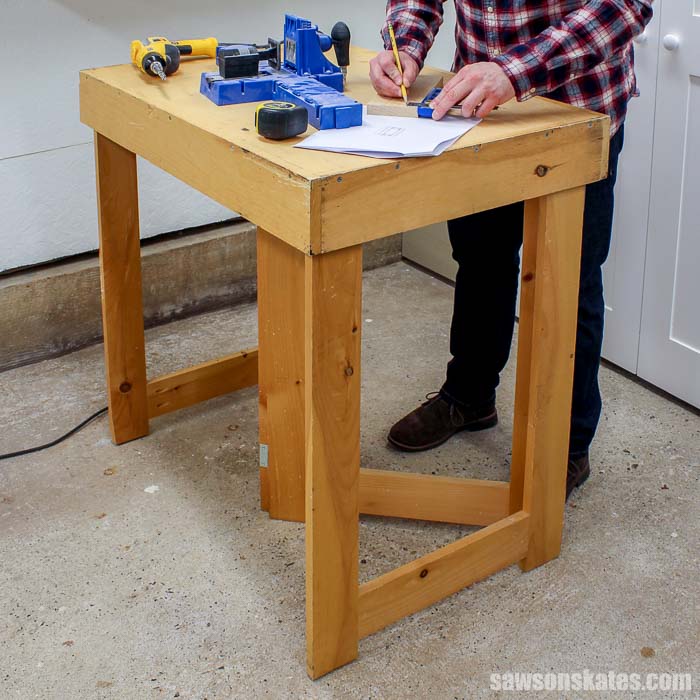
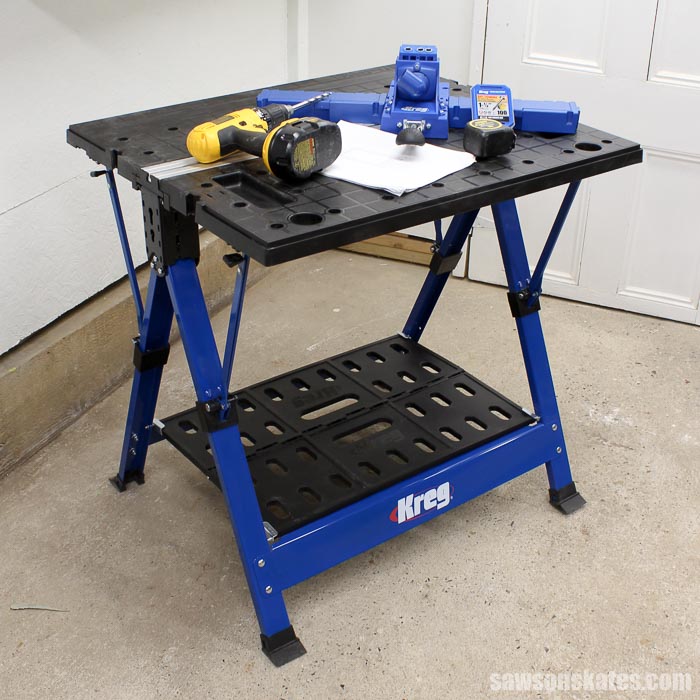
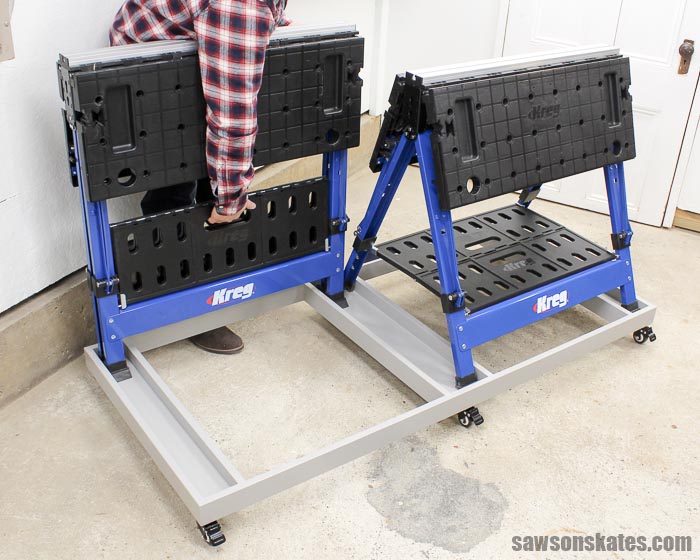
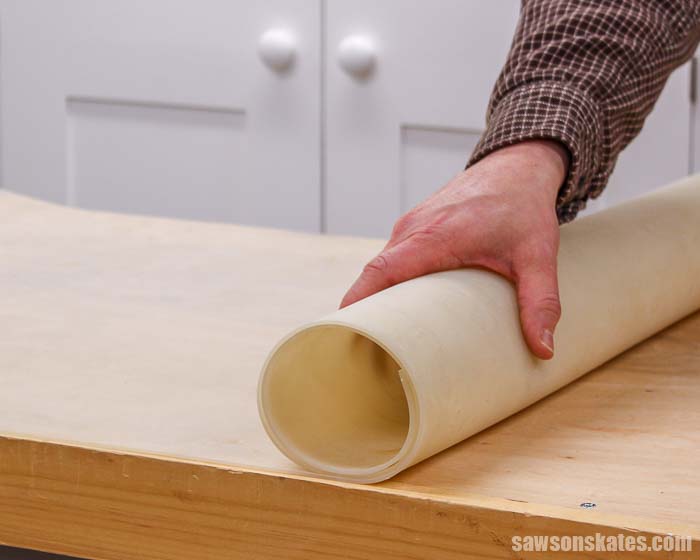
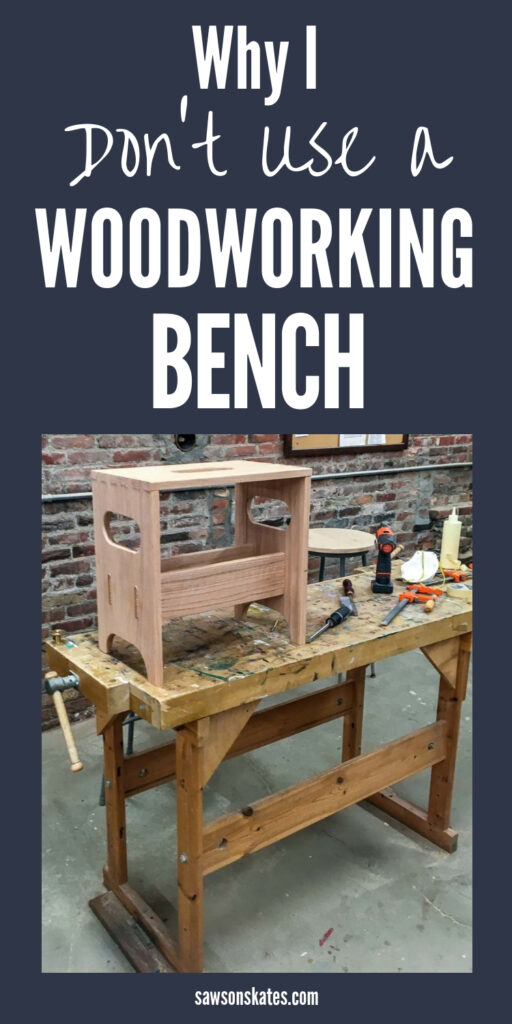
You are absolutely right! I only use folding workbenches, just like you, and it works just fine. Sometimes I use my shed floor to work on bigger parts 🙂
Hi Roland – Thank you for stopping by. That’s exactly the way I do it for bigger projects… fold up my workbench and build on the floor!
Thanks, so helpful! I’m planning to get a shed next year to set up a tiny workshop, always assumed the bench would take up most of the space. This gives me some new ideas–also knowing that you do all you do in a 10×13 space.
Hi Nancy – I’m glad this was helpful and inspirational for you. Good luck with building your shed shop!
Don’t know how you do it with a 10×13 work shed . most me is 14×20 and it’s really hard to get space for the tools but storing the wood is damn near impossible . With trying to find room for all their is no place to work .
Hi Scott. I’ve been following you now for a few months. I have been building a small wood shop in my 18×18 garage. It can be tough as it also serves as storage for camping gear, Christmas decor, and other misc things. I’m planing on building a small rolling workbench. And some cabinets similar to yours. Thanks for all the tips and info. Keep doing what your doing.
Regards
Jim in Surrey BC
Hi Jim – Thank you for following along and for the compliments. Good luck with your garage wood shop build. Can’t wait to see how it turns out!